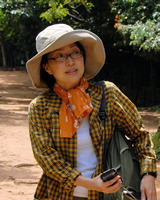MARUI, Masako

- Name
- MARUI, Masako (Faculty Database)
- Job Title
- Professor
- Teaching Area
- Southeast Asian Archaeology; Cultural Heritage Studies
- Career Summary
1994 Sophia University Master Program in History Graduate School of Humanities,
1997 – 2001 Complete Sophia University Doctoral Program in Area Studies Graduate School of Foreign Language,
Since August 1994, been engaged in archaeological research at Banteay Kdei as a member of the Sophia University International Research Team on Angkor.
Oct.1995-Jul.1997 Government student sent to Cambodia.
Oct,1997 – Mar.1998 Lecturer of Archaeology at The Royal College of Art, Phnom Pen.
Oct.1998 – Feb.2003 As PIC of human resources development at Sophia Angkor Training Institute(current Sophia Asia Center for Researh and Human Development), engaged in archaeological surveys and research.
After assuming the post of Assistant Researcher of Sophia COE Program on Apr.2003, the part-time lecturer etc. , current position since 2007.
- Rooms/Office Hours
2-626 Wed. 13:30~15:00 or by appointment
- Message to Students
“Training to travel from local to global”
This is what I want to teach you in the Faculty of Global Studies. In this case, it is not quite actually training your legs to travel around various parts of the world.
Let me explain using the example of the Angkor monuments in Cambodia. The Angor monuments were included in the World Heritage List in 1992, and various countries and organizations under the auspices of an international cooperative support system are now working on the restoration and surveys. Also, Angkor has become a world-famous tourist destination, attracting a large number of foreign tourists. The tourism industry that supports this shows a notable growth. However, after the civil war from the 1970s to the end of the 1980s, I believe that the significance and value of the Angkor monuments as a “world heritage” has been continuously emphasized as a banner for the reconstruction of the Cambodian nation. While the aspect of global cultural heritage has been emphasized too far, have we not overlooked the feelings and thoughts of people living close to the Angkor monuments? I hope that through our excavation research of the Angkor monuments and its history, we can provide the people of such regions with material for their “local history” or “regional history”. Let’s think together about the “linkage between the local and the global” encompassed by the Angkor monuments themselves!
